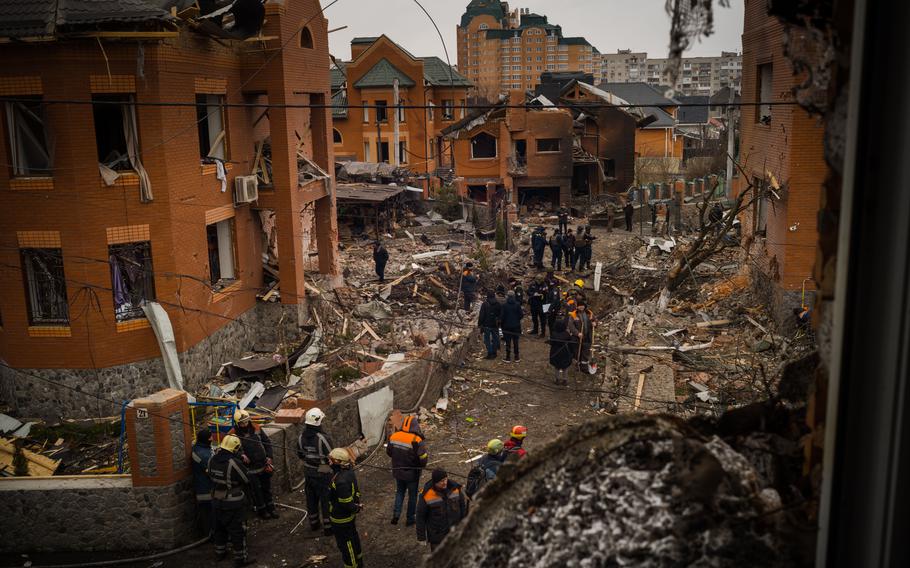Europe
Putin is bombing the ‘Russian world’ he claims to protect
The Washington Post March 8, 2022

Damaged buildings in a residential area of Bila Tserkva. (Wojciech Grzedzinski/The Washington Post)
Russia’s invasion of Ukraine has damaged landmarks across the historic center of the mostly Russian-speaking city Kharkiv, including an opera house, and threatened the Derzhprom building, a classic example of constructivist architecture that was the tallest skyscraper in the Soviet Union when it opened in 1928.
Ukrainian officials said Russian air raids also damaged the Assumption Cathedral, an Orthodox church that was built in the the late 1700s — during the Russian Empire — and rebuilt after a fire in a style inspired by Saint Clement Church in Moscow. It had a bell tower commemorating Tsar Alexander I’s victory over Napoleon.
In footage of the aftermath of Russian strikes, people can be heard saying “Russkiy mir,” or “Russian world,” as they survey the damage. It’s a reference to Russian President Vladimir Putin’s often repeated assertion: that all Russian speakers belong to Russia, which has a responsibility to “defend” them. It became his pretext to invade Ukraine.
While the theory does not have much traction beyond Putin and other hard-liners in Russia, the damage his troops are inflicting on Russian-speaking civilians in eastern Ukraine, as well as to the cities and institutions that are a testament to their intertwined history, highlights the contradiction.
Putin’s attacks undermine his ideology that Russians and Ukrainians are “one people,” said Ronald G. Suny, a history professor at the University of Michigan.
Russia’s invasion and destruction of parts of Kharkiv and other cities “limits or at least contradicts” the idea that Ukraine and Russia are part of a shared Russian world, said Suny, an expert on nationalism and the formation of national identity in the former Russian Empire and Soviet Union.
Putin has employed many controversial arguments to justify his invasion. He has charged that the West turned Ukraine into an “anti-Russia” and that Kyiv’s goal of joining NATO was a “red line.” And he has accused Ukraine of committing “genocide” against the Russian-speaking people of the eastern Donbas region. While never producing evidence for his claim, Putin cited his need to defend them - underpinned by his revanchist view that much of Ukraine exists on territory that is historically Russia’s.
Putin claimed Ukraine as “an inalienable part of our own history, culture and spiritual space” in a speech on Feb. 21, before the invasion. He formally recognized the self-proclaimed Donetsk People’s Republic and Luhansk People’s Republic, Moscow-backed separatist enclaves in the Donbas, and claimed against historical evidence that Ukraine “never had stable traditions of real statehood,” saying “modern Ukraine was entirely created by . . . Bolshevik, Communist Russia.”
Yet Putin’s invasion has not spared the Russian-speaking areas and historical links to Russia. In Kharkiv, Ukraine’s second-largest city, near the Russian border, Russian forces have bombed several cultural sites, according to Oleksandr Tkachenko, Ukraine’s culture minister, including the Assumption Cathedral and parts of the Kharkiv National University of Arts and the Kharkiv State Academy of Culture.
Ukrainian President Volodymyr Zelensky touched on the “tragic irony” of the destruction in Kharkiv in a speech on Thursday. Putin “said that there are many challenges in Ukraine, including nationalism,” said Zelensky, according to an English-language translation by Ukrinform. “Now there’s a bombing outside the Assumption Cathedral. A Russian bomb was launched on the Moscow Patriarchate Church. So much for Putin defending his church.”
Video taken on March 3 shows heavy damage to the historic center of Kharkiv caused by Russian bombardments.
Kharkiv holds a special place in both Russian and Ukrainian history.
Scholars Natalia Shapovalova and Balazs Jarabik wrote in 2018 for the Carnegie Center think tank that the city “was established in 1654, the same year that Russia’s colonization of Ukraine began following the Treaty of Pereyaslav between the Russian tsar and the Cossack hetman, Bohdan Khmelnytsky.”
It became “a Ukrainian intellectual, cultural, and industrial urban center in the Russian Empire” and later “served as the capital of the Ukrainian Soviet Socialist Republic between 1919 and 1934,” they wrote.
Kharkiv was then occupied by the Nazis during World War II and rebuilt under the Soviet Union in its aftermath. Russian forces are “destroying that as well,” said the University of Michigan’s Suny. “All the past is in some ways being obliterated, and that totally undermines this idea that we’re ‘one people.’ “
In 2014, as Russian-backed separatists seized control of Donetsk and Luhansk, one group briefly took control of Kharkiv’s city hall, declaring it the Kharkiv People’s Republic. That separatist rebellion was ultimately unsuccessful, and in the years since, public sentiment has shifted closer to the Ukrainian side.
Suny said “Russkiy mir” helped Putin fill an “ideological, or you could call it discursive, vacuum” after the collapse of the Soviet Union.
A “way of understanding yourself, others, Russia, the West, the future, history, [also] collapsed,” he said, “and ever since that time, in Russia at least, and in other republics as well of the former Soviet Union, they’ve been trying to ... find some other ideological conception ... that would sustain a degree of [historical] coherence.” He noted: “They haven’t succeeded that well.”
The war is likely to further strengthen opposition to Moscow within Ukraine, Suny said. “I hear from Russians the following: ‘Well, if we are one people, as Putin says, how come we’re making war on some of our own people and now launching attacks on the cities?’”
The Washington Post’s Ellen Francis, Isabelle Khurshudyan and Miriam Berger contributed to this report.